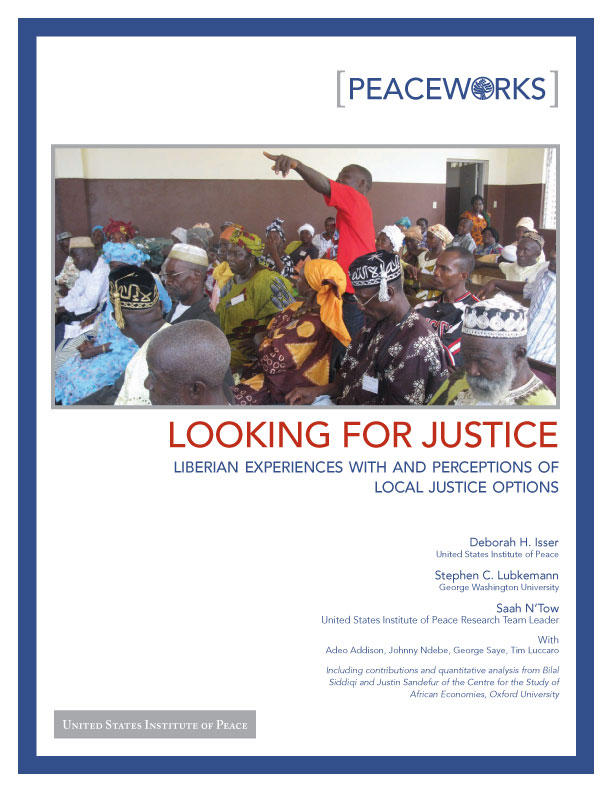This report presents the research findings and analysis of ten months of field study as part of the United States Institute of Peace and George Washington University project titled "From Current Practices of Justice to Rule of Law: Policy Options for Liberia's First Post-Conflict Decade."
Summary
This report presents the research findings and analysis of ten months of field study as part of the United States Institute of Peace and George Washington University project titled "From Current Practices of Justice to Rule of Law: Policy Options for Liberia's First Post-Conflict Decade." The analysis we present, based on three types of research methods (focus groups, individual interviews with parties to specific disputes, and interviews with chiefs, zoes [traditional leaders], and other justice practitioners) employed primarily in three counties (Grand Gedeh, Lofa, Nimba, and less extensively in parts of Monrovia), is intended to provide the Liberian government and other stakeholders in the country with more robust evidence than has hitherto been available on how both formal and customary justice systems are perceived and utilized by Liberians. It also addresses what implications this evidence has for policy options regarding justice sector reform. Our methodology was designed to trace actual practice of dispute resolution, regardless of which institution--formal, customary, or other--was involved. This allows us to understand the choices made by litigants and their levels of satisfaction in relational value to the available alternatives. These realities facing Liberians in the pursuit of justice, as well as the social beliefs that inform Liberians' conceptions of justice, are critical to take into account in any effort to design a successful justice strategy for the immediate and medium terms.
About the Authors
Deborah H. Isser worked in United States Institute of Peace’s Rule of Law Center from August 2004 until December 2010. During her time at USIP, she directed projects on the role of nonstate justice systems in post-conflict societies and on addressing property claims in the wake of conflict. Previously, she was a senior policy adviser at the Office of the High Representative in Bosnia and Herzegovina, where she focused on economic reform and efforts to address serious crime and corruption. From 2000 to 2001, she was a special adviser for the U.S. Mission to the United Nations. She received the Department of State’s Distinguished Honor Award for her work on UN peacekeeping reform in the context of the Brahimi Report. She was also a member of the team responsible for settling U.S. arrears to the United Nations.
Stephen C. Lubkemann is assistant professor of anthropology and of international affairs at the George Washington University, where he began teaching in 2002. He received his PhD in 2000 from the Department of Anthropology at Brown University, where he retains an adjunct appointment at the Watson Institute for International Studies. He has done extensive fieldwork in Mozambique and South Africa, and in Europe and the United States with African refugees and diaspora communities. His ongoing research includes a project initiated in 2004, with research grants from the United States Institute of Peace and the Harry Frank Guggenheim Foundation, that examines the political and socioeconomic influence of displacement diasporas in their war-torn countries of origin through a specific study of the Liberian case.
Saah N’Tow currently heads the President’s Young Professionals and the Scott Fellows’ Program in Liberia, joint programs between the government of Liberia, the Center for Global Development, and John Snow Incorporated. He formerly served as the national coordinator of the field research team on the United States Institute of Peace and George Washington University research project “From Current Practices of Justice to Rule of Law: Policy Options for Liberia’s First Post-Conflict Decade.” He holds master’s degrees in humanitarian assistance and human services administration from Tufts University and Springfield College, respectively, and a bachelor’s degree in mathematics from the University of Liberia. As a community activist and independent researcher and writer, he has been engaged with issues of concern to the Liberian diaspora in the United States, including its role in its homeland, and more generally with economic and social development initiatives in his native Liberia. He has also published a collection of original poetry titled Dirges for My Homeland.
